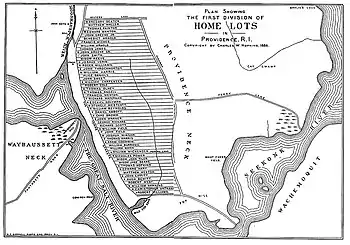Thomas Hopkins (settler)
Thomas Hopkins (1616–1684) was an early settler of Providence Plantations and the great grandfather of brothers Esek Hopkins, the only Commander in Chief of the Continental Navy during the American Revolutionary War, and Stephen Hopkins who was many times colonial governor of Rhode Island and a signer of the Declaration of Independence.
Thomas Hopkins | |
|---|---|
| Born | baptized 7 April 1616 |
| Died | 1684 Oyster Bay, New York |
| Education | signed name with a mark |
| Occupation(s) | Commissioner, Deputy |
| Children | William, Thomas, Joseph who married Elizabeth and had two children |
| Parent(s) | William Hopkins and Joane Arnold |
| Relatives | Nephew of William Arnold First cousin of Governor Benedict Arnold Great grandfather of Governor Stephen Hopkins and Commodore Esek Hopkins |
Hopkins was baptized in Yeovilton, county Somerset, England on 7 April 1616, the son of William Hopkins and Joane (Arnold) Hopkins.[1] His mother was the sister of early Providence settler William Arnold and the daughter of Nicholas and Alice (Gully) Arnold of Northover and Ilchester in Somerset.[1][2] Hopkins' mother died when he was five years old, after which he and his sister Frances were probably taken into the family of their Uncle William Arnold, and most writers on his early history agree that he sailed to New England at age 19 with his uncle's family in 1635.[3] On the same ship was his first cousin Benedict Arnold, also aged 19, the future governor of the Rhode Island colony.
The Arnolds first settled in Hingham in the Massachusetts Bay Colony, but they remained there less than a year. They joined Roger Williams in April 1636 and were among the first settlers of Providence Plantations. Soon after, they were the first English settlers on the Pawtuxet River, the southern edge of Williams's Providence purchase.[4] Hopkins was not yet of age when they settled here, but when he reached his majority he was one of 39 signers of an agreement in 1640 to form a government in Providence, signing his name with a mark.[5]
From 1652 to 1672, Hopkins served in a number of civic positions in Providence, including Commissioner, Deputy, and member of the Town Council.[5] In 1676, King Philip's War raged in Rhode Island, and all of the Pawtuxet settlement and most of Providence were destroyed. Hopkins' oldest sons William and Thomas either remained in Providence or returned there shortly after the war. After the death of his youngest son Joseph,[6] Hopkins, his daughter-in-law Elizabeth and her two children Ichabod and Anna, moved to Oyster Bay on Long Island in the Province of New York and remained there.[5] His daughter-in-law Elizabeth then married Richard Kirby. Hopkins was living in the home of Kirby when he died in 1684.[5]
Images
 Town layout of Providence with Hopkins' lot ninth from bottom
Town layout of Providence with Hopkins' lot ninth from bottom Detail showing Hopkins' lot overlaid on contemporary map
Detail showing Hopkins' lot overlaid on contemporary map
References
- Moriarty 1944, p. 224.
- Anderson, Sanborn & Sanborn 1999, pp. 84, 89.
- Arnold 1935, p. 25.
- Bicknell 1920, pp. 143, 158.
- Austin 1887, p. 324.
- Ancestors of Frank Herbert Davol and his wife Phebe Downing Willits;showing Mayflower descent from John Alden, James Chilton ... John Cooke ... Priscilla Mullines, Richard Warren. F.H. Hitchcock. 22 July 2021.
Bibliography
- Anderson, Robert Charles; Sanborn, George F. Jr.; Sanborn, Melinde L. (1999). The Great Migration, Immigrants to New England 1634–1635. Vol. I A–B. Boston: New England Historic Genealogical Society. ISBN 0-88082-110-8.
- Arnold, Elisha Stephen (1935). The Arnold Memorial: William Arnold of Providence and Pawtuxet, 1587–1675, and a genealogy of his descendants. Rutland, VT: Tuttle Publishing Company. OCLC 6882845.
- Austin, John Osborne (1887). Genealogical Dictionary of Rhode Island. Albany, New York: J. Munsell's Sons. ISBN 978-0-8063-0006-1.
- Bicknell, Thomas Williams (1920). The History of the State of Rhode Island and Providence Plantations. Vol. 1. New York: The American Historical Society. pp. 143, 158.
- Moriarty, G. Andrews (April 1944). "Additions and Corrections to Austin's Genealogical Dictionary of Rhode Island". The American Genealogist. 20: 224.
- Ancestors of Frank Herbert Davol and His Wife, Phebe Downing Willits. F.H. Hitchcock. 22 July 2021.
External links
- Rhode Island History from the State of Rhode Island General Assembly website. See Chapter 2, Colonial Era.